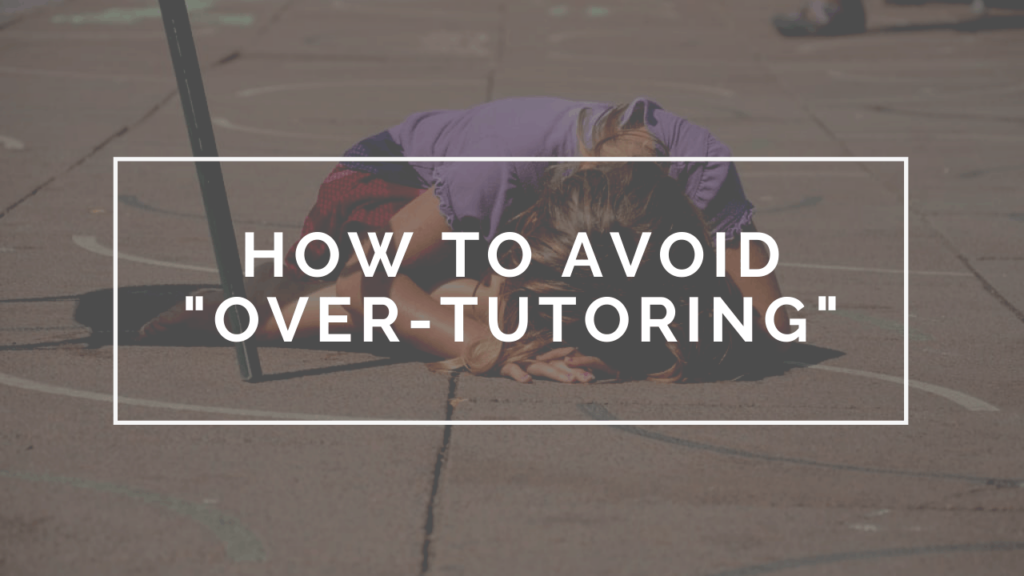Many years ago, when I was sitting my GCSEs, my year group were half-shocked and half-impressed when a girl in my year memorised all of the answers to her French oral exam. We all knew this wasn’t in the spirit of the exam – we were supposed to be able to speak French somewhat fluently, not have just memorised a few choice phrases – but we also knew that she would likely get a much better mark than any of us. And we were right.
I’m reminded of this experience when I hear of grammar and private schools that specify they do not want children to have been “over-tutored”. I’m sure that the writers of the French GCSE exam would have preferred that students didn’t memorise their textbooks but, unfortunately, they had created a system that rewarded such behaviour. So, considering that schools do want your child to be fairly knowledgeable, how do you avoid the “over-tutoring” that they’re so against?
Structuring Tuition
When you’re dealing with young children, it’s especially important to avoid training them to regurgitate the material that a tutor has given them, not least because they are liable to telling an assessor that their tutor made them do it this way.
To avoid children outing their parents and tutors when they attend their exams, a more fluid approach to teaching is preferable. In our view, formal lessons with a tutor should feel almost like working with a parent at home, just in a more efficient and targeted way. For example, a lesson could engage children in lively discussions about their lives and the books they’re reading, whilst guiding them with subtle prompts to improve their vocabulary and grammar. Similarly, written maths can be supplemented with practical, hands-on tasks that provide an opportunity to problem-solve rather than learn by rote.
Although it is possible to improve a child’s English skills immensely through conversation, it is important to bear in mind that they will need to be able to write some of these ideas down in order to be assessed; and they will need to become proficient in doing so. There will also be aspects of basic grammar and punctuation that really should be covered, but this should never get in the way of a good story.
Some tutors will advise that children memorise a story that they have written and simply adapt the story to the question given in the exam. We advise our customers to avoid this at all costs. Not only is this highly transparent to the examiner, but also means that children haven’t learnt the core creative writing skills they will need to survive at a school once they’ve passed the entrance exam. In addition, learning to game the system at such an early age can surely only send a bad message about academia to young children.
When it comes to maths, formal classes on different subjects are essential in order to introduce prospective 7+ and 11+ students to topics they may not have covered at school. However, these structured classes can be supported with activities at home that can help to develop a well-rounded mini-mathematician.
Helping Your Child at Home
In an attempt to foil children that have been tutored to within an inch of their lives, many schools (including 11+ grammar schools) are incorporating more and more problem-solving questions into their entrance exams. This is supposed to benefit children that have natural problem-solving abilities rather than those who have been through hours and hours of rote learning.
There are many ways that you can develop problem-solving skills in a fun way at home. This is our favourite type of learning as everybody wins – parents are happy as their child is learning, and children are happy because they get to play.
Activities for Younger Children
Activities such as board games (like Snakes and Ladders), treasure hunts, baking, arts and crafts, and even some computer games can develop a child’s ability to think creatively to solve a problem.
Learning how to play a game by reading instructions can also develop your child’s comprehension skills. Familiarising children with the structure and tone of instructions can be beneficial as they may be asked to write their own instructions in a 7+ exam.
To develop a child’s handwriting, you can again turn to games. Operation is a game that develops children’s fine motor skills, which will help them immensely with their handwriting. If your child is too young for operation, other activities such as colouring in and playing with small LEGO bricks will develop these skills too.
Activities for Older Children
For slightly older children, Yahtzee is a game that develops an understanding of probability and provides an opportunity to practise mental addition and multiplication. Classics like Monopoly (to practise adding, subtraction and working with money) and Scrabble (for spelling and vocabulary) are also great.
Baking together is a fantastic way to introduce measure and conversion to your son or daughter. Try to use both imperial and metric measures in different recipes to cover even more material at home.
In all, avoiding over-tutoring your child is about a little and often approach. By providing your child with a variety of fun and interesting learning opportunities alongside their formal education, you can ensure that your child naturally develops a variety of skills that will lead them to success in the 7 or 11+ exams.

